Trump announces new weapons for Ukraine, threatens tariffs on Russia
US President Donald Trump announced a shipment of weapons for Ukraine while threatening tariffs on Russia.
Source link
Stay informed and up-to-date with the latest news from around the world. Our comprehensive news coverage brings you the most relevant and impactful stories in politics, business, technology, entertainment, and more.
US President Donald Trump announced a shipment of weapons for Ukraine while threatening tariffs on Russia.
Source link
England’s magnificent win came six years to the day since Eoin Morgan’s white-ball side memorably lifted the World Cup at the same venue, with Jofra Archer bowling the hosts to victory against New Zealand in the super over.
Stokes said he felt Archer – in his first Test match since 2021 – would produce another special performance on day five against India.
“He cracked the game open with those two wickets,” said Stokes of Archer’s dismissals of Rishabh Pant and Washington Sundar in the morning session.
“I just had this gut feeling something was going to happen, with it being Jofra’s first time back.
“It’s been awesome to have him back out there, every time he gets announced you hear the whole ground erupt. When he turns it on, the speeds come up on the screen, and the feeling in the game just changes.”
With two Tests remaining, the on-field tensions during the Lord’s encounter have added a little extra heat to the series, which will motivate both sets of players.
India seamer Mohammed Siraj was fined 15% of his match fee and given one demerit point by the match referee for his celebration after dismissing Ben Duckett on day four, which followed an altercation between Zak Crawley and Shubman Gill the preceding evening.
On the final day, there was a collision between Ravindra Jadeja and Brydon Carse in the middle of the pitch as the batter set off for a run, with Stokes eventually separating the pair.
“It’s a massive series, emotions are going,” added Stokes. “All 22 players are playing for their country and I don’t think anyone in the either dressing room is going to be complaining about what was said.
“A bit of niggle out in the middle gets over-egged from people watching.
“I’m all for it. I don’t think it went over the line whatsoever. It adds to the theatre.”

Uprooted by the ongoing violent conflict in the Democratic Republic of Congo (DRC), locals in the Bahunde chiefdom of North Kivu are lamenting the dire humanitarian conditions they have faced since their return. The Congolese, mainly from the Bishange and Luzirantaka areas, previously fled their homes when they were caught between the DRC army and the Rwanda-backed M23 rebels.
In a letter to the global humanitarian community, the returnee crisis committee highlighted how food insecurity affects thousands of households across the Bishange and Bitonga zones. They report that since returning to their homes, residents have received no assistance, despite losing everything during violent clashes in their communities.
“The food and non-feeding needs are enormous because we lost everything during the armed violence in our zone,” the returnees stated in the letter. “We call on humanitarian organisations to take this question seriously because we are already recording cases of serious malnutrition due to a lack of food. We call on international non-governmental organisations (NGOs) to save lives.”
The locals returned to their villages after the area was occupied by M23 rebels, following intense clashes with government forces.
The fighting devastating the DRC has lingered for decades, with M23 rebels, among others, waging a war against the government. The conflict is deeply rooted in long-standing ethnic, political, and economic tensions in the country’s eastern region. After defecting from the Congolese army, a Tutsi-dominated rebel group founded the M23 in 2012. The group accused the DRC government of refusing to adhere to the 2009 peace agreement, particularly regarding protecting Tutsi communities and political inclusion. They were defeated in 2013 after capturing Goma, a bustling city in the country, forcing them to flee to Rwanda and Uganda.
The group re-emerged in 2021 and launched a new offensive in 2022, rapidly gaining territory in North and South Kivu provinces. By early 2025, M23 had seized major cities like Goma and Bukavu, displacing millions and triggering a humanitarian crisis. The DRC government, the United Nations, and several Western powers accused Rwanda of providing direct military support to M23, including troops, weapons, and logistical aid. A 2025 UN report, for instance, concluded that Rwanda exercised “command and control” over M23 operations, with thousands of Rwandan troops active in eastern Congo.
Rwanda, however, denied these allegations, claiming its actions are defensive and aimed at neutralising the Forces Démocratiques de Libération du Rwanda (FDLR), a Hutu rebel group in the DRC linked to the 1994 Rwandan genocide. Analysts argue that Rwanda’s motivations go beyond security concerns, pointing to its interest in controlling mineral-rich territories in eastern Congo. The resurgence of M23 is widely seen as a proxy strategy by Kigali to assert regional influence and secure access to valuable resources like gold, coltan, and cobalt. The conflict remains unresolved despite international pressure and sanctions, with peace efforts complicated by deep mistrust and competing regional interests.
Amidst the ongoing conflict in the Democratic Republic of Congo, residents of the Bahunde chiefdom in North Kivu face dire humanitarian conditions after returning to their homes.
The returnee crisis committee reports severe food insecurity, with no aid provided despite extensive losses during the clashes between the DRC army and M23 rebels.
The M23, a Tutsi-dominated rebel group founded in 2012, accused the DRC government of neglecting a peace agreement, leading to prolonged conflict. After a temporary defeat in 2013, the group re-emerged in 2021, seizing major cities by 2025 and causing massive displacement. Accusations of Rwandan support for M23 have been met with denials, though analysts suggest Rwanda seeks to control mineral-rich territories in eastern Congo.
The complex situation remains unresolved with ongoing international efforts hindered by regional rivalries and mistrust.
France's interior minister says it is time for the country to “rearm” as the world becomes more dangerous.
Source link
President Zelenskyy taps economy minister to lead government in most significant reshuffle since Russia’s full-scale invasion.
Ukrainian President Volodymyr Zelenskyy says he has recommended Economy Minister Yulia Svyrydenko to become prime minister in a significant political shake-up for the war-scarred country.
The announcement on Monday could herald a wider reshuffle in the government, three and a half years into the Russian invasion.
“I have proposed that Yuliia Svyrydenko lead the government of Ukraine and significantly renew its work,” Zelenskyy wrote on social media. “I look forward to the presentation of the new government’s action plan in the near future.”
The recommendation is part of what he called “a transformation of the executive branch” of government in Ukraine.
The two discussed “concrete measures to boost Ukraine’s economic potential, expand support programs for Ukrainians and scale up our domestic weapons production”, Zelenskyy said.
Svyrydenko, 39, gained prominence this year during fraught negotiations around a rare minerals deal with the United States that nearly derailed ties between Kyiv and its most important military ally.
If the change is approved, she would replace Denys Shmyhal, who became prime minister in 2020.
“The government needs a change because people are exhausted,” said Tymofiy Mylovanov, a former economy minister who worked with Svyrydenko.
Mylovanov, who now heads the Kyiv School of Economics, said the changes would likely bring “a sort of freshness” after more than three years of war.
Zelenskyy is also considering naming Defence Minister Rustem Umerov as Ukraine’s ambassador to Washington, he said at a news conference last week.
Zelenskyy met Umerov over the weekend, after which he said, “Ukraine needs more positive dynamics in relations with the United States and at the same time new steps in managing the defence sector of our state.”
Svyrydenko, who is also a deputy prime minister, was appointed to manage Ukraine’s struggling economy months before the Kremlin launched its full-scale assault in February 2022.
Her appointment will require approval by parliament, which has largely united around Zelenskyy since the invasion and is unlikely to vote against the president.
India and Pakistan have been fighting over Kashmir for decades, and Kashmiris on both sides of the Line of Control, a de facto border that cuts Kashmir into two, are caught in the middle of it all.
Why do India and Pakistan fight over Kashmir? And what do Kashmiris want? #AJStartHere with Sandra Gathmann explains.
This episode features:
Sumantra Bose – Professor of international and comparative politics, Krea University
Hafsa Kanjwal – Associate professor of South Asian studies, Lafayette College
Amitabh Mattoo – Professor, School of International Studies, Jawaharlal Nehru University
Special thanks to Alia Chughtai, senior producer at AJLabs, for helping and advising the Start Here team with this episode.

 BBC/Amjad Al Fayoumi/Hoyo Films
BBC/Amjad Al Fayoumi/Hoyo FilmsA BBC documentary about Gaza breached editorial guidelines on accuracy by failing to disclose the narrator was the son of a Hamas official, the corporation’s review has found.
BBC director general Tim Davie commissioned the review into Gaza: How to Survive a War Zone, after it was pulled from iPlayer in February when the boy’s family connections emerged.
The review found that the independent production company, Hoyo Films, bears most of the responsibility for the failure. But it also said the BBC bore some responsibility and should have done more in its oversight.
The BBC said the programme should not have been signed off, and it was taking appropriate action on accountability.
The review found three members of the independent production company knew of the father’s position as deputy minister of agriculture in the Hamas-run government in Gaza, but no-one within the BBC knew this prior to broadcast
However, the report criticised the BBC team for not being “sufficiently proactive” with initial editorial checks, and for a “lack of critical oversight of unanswered or partially answered questions” ahead of broadcast.
The review also said it had seen no evidence “to support the suggestion that the narrator’s father or family influenced the content of the programme in any way”.
It added the narrator’s scripted contribution to the programme did not constitute a breach of due impartiality.
However, the report concluded that the use of the child narrator for this programme was “not appropriate” in the circumstances.
Speaking after its publication, BBC News CEO Deborah Turness told Radio 4’s The World at One: “We are owning where we have made mistakes, finding out what went wrong, acting on the findings, and we’ve said we’re sorry.”
She said the BBC figures overseeing the documentary should have known about the boy’s position before transmission, “because their questions should have been answered by the independent production company”.
The BBC said it was taking a number of steps to prevent a similar breach being repeated:
The review found the production company did not intentionally mislead the BBC, adding: “They made a mistake, and should have informed the BBC about it. The BBC does also bear some responsibility for this failure.”
Hoyo Films said it took the reviews findings “extremely seriously” and said it “apologises for the mistake that resulted in a breach of the editorial guidelines”.
The company said it was pleased the report had found there was “no evidence of inappropriate influence on the content of the documentary from any third party”.
It said it welcomed the report’s recommendations and “hope they will improve processes and prevent similar problems in the future”.
Hoyo Films said it would work closely with the BBC to explore the possibility of using some material for re-edited and re-versioned shorter films for archive on iPlayer.
The BBC’s director general Tim Davie apologised, saying the report “identifies a significant failing in relation to accuracy”.
“We will now take action on two fronts,” he continued. “Fair, clear and appropriate actions to ensure proper accountability and the immediate implementation of steps to prevent such errors being repeated.”
The corporation did not name any individuals facing disciplinary action.
A financial examination as part of the review found that a fee of £795 was was paid for the narrator, paid to his adult sister, an amount which was not “outside the range of what might be reasonable in the context”.
The boy also received a second-hand mobile phone and gift card for a computer game. Together with the fee, that amounted to a total value of £1,817.
The review also found there was “significant resource strain within both the production company and the BBC” ahead of the programme’s broadcast.
Following the review’s publication, when asked if she still had confidence in Davie, Culture Secretary Lisa Nandy said: “It’s not for the government to say who should and shouldn’t work at the BBC.
“My job is to make sure that we uphold the highest standards and that the public and parliament can have confidence in the BBC.
“I think, given the recent events, that has been called into question, but the BBC in recent weeks has made big strides to try to reset that relationship with the public, and show that they have grip on the very very serious issues.”
Nandy said she had met Davie and BBC chair Samir Shah last week. She added: “It is important that the BBC has acknowledged that there have been a series of catastrophic failures over recent weeks.”
The review was conducted by Peter Johnston, the BBC’s director of editorial complaints and reviews.
The team who worked on the review identified and considered 5,000 documents from a 10-month production period, as well as 150 hours of material filmed during production, to inform Mr Johnson’s conclusions, the BBC said.
The BBC Board said: “Nothing is more important than trust and transparency in our journalism. We welcome the actions the Executive are taking to avoid this failing being repeated in the future.”
But the campaign Against Antisemitism launched a scathing attack on the BBC after the report was published, saying its recommendations were “frankly insulting”.
“The report says nothing we didn’t already know: paying licence fee money to a Hamas family was bad,” the CAA said. “The report yields no new insight, and almost reads like it’s trying to exonerate the BBC.”
More than 40 Jewish television executives, including former BBC content chief Danny Cohen and JK Rowling’s agent Neil Blair, previously wrote to the BBC with questions about editorial failings surrounding the film.
Separately, 500 media figures including Gary Lineker, Anita Rani, Riz Ahmed and Miriam Margolyes signed an open letter in February in support of the film.
Dame Melanie Dawes, CEO of broadcast regulator Ofcom, said the BBC had been slow to get a grip on recent scandals such as the Gaza documentary as well as the broadcast of Bob Vylan’s controversial set at Glastonbury.
Speaking to Sunday with Laura Kuenssberg, she said there was a “real risk” recent events could lead to “loss of confidence” in the broadcaster, adding: “It’s very frustrating that the BBC has had some own goals in this area.”
In June, the BBC pulled another documentary titled Gaza: Doctors Under Attack, due to impartiality concerns it had surrounding the production. That film was then broadcast by Channel 4.
Two groups of commercial pilots reject initial probe into the deadly June 12 crash, calling it a ‘reckless and unfounded insinuation’.
Two groups of commercial pilots have rejected claims that human error caused an Air India plane crash that killed 260 people after a preliminary investigation found the aircraft’s engine fuel switches had been turned off.
The Indian Commercial Pilots Association (ICPA) and the Airline Pilots’ Association of India (ALPA India) issued statements on Sunday after the release of the initial findings, which showed that fuel control switches to the engines of Flight AI171 were moved from the “run” to the “cutoff” position moments before last month’s deadly impact.
The report sparked speculation by several independent aviation experts that deliberate or inadvertent pilot action may have caused the Boeing 787-8 Dreamliner to crash soon after takeoff from Ahmedabad in western India.
Flight AI171 was headed to London’s Gatwick Airport when it crashed on June 12.
The report on the crash, issued on Saturday by India’s Aircraft Accident Investigation Bureau (AAIB), did not offer any conclusions or apportion blame for the disaster but indicated that one pilot asked the other why he cut off the fuel and the second pilot responded that he had not.
After the switches flipped, the Boeing 787 Dreamliner immediately began to lose thrust and altitude, according to the report.
One pilot can be heard on the cockpit voice recorder asking the other why he had cut off the fuel. “The other pilot responded that he did not do so,” the report said.
It did not identify which remarks were made by the flight’s captain and which by the first officer or which pilot transmitted “Mayday, Mayday, Mayday” just before the crash.
No more details about the cockpit dialogue between the pilots were revealed.
The ICPA said it was “deeply disturbed by speculative narratives, … particularly the reckless and unfounded insinuation of pilot suicide”.
“There is absolutely no basis for such a claim at this stage,” it said in a statement. “It is deeply insensitive to the individuals and families involved.
“To casually suggest pilot suicide without verified evidence is a gross violation of ethical reporting and a disservice to the dignity of the profession.”
The ICPA was referring to a number of aviation experts suggesting engine fuel control switches can only be moved deliberately and manually.

United States-based aviation safety expert John Cox earlier said a pilot would not be able to accidentally move the fuel switches that feed the engines. “You can’t bump them and they move,” he told the Reuters news agency.
ALPA India, which has 800 members, also accused the investigative agency of “secrecy” surrounding the investigation, saying “suitably qualified personnel” were not involved in it.
“We feel that the investigation is being driven in a direction presuming the guilt of pilots and we strongly object to this line of thought,” ALPA India President Sam Thomas said in a statement issued on Saturday.
ALPA requested the AAIB be included as “observers so as to provide the requisite transparency in the investigations”.
Meanwhile, Air India CEO Campbell Wilson said the probe into last month’s crash is far from over and it is unwise to jump to any premature conclusions.
Wilson added: “The preliminary report identified no cause nor made any recommendations, so I urge everyone to avoid drawing premature conclusions as the investigation is far from over.”
The crash killed all but one of the 242 people on board as well as 19 people on the ground.
It might seem bizarre to speak of hope in these dark times. In Palestine, the horror of genocidal violence is coupled with the sickening acquiescence of Western powers to it. In Sudan, war rages, with the people of Darfur once again facing war crimes on a mass scale. While in the United States, the blitzkrieg advance of broligarchic authoritarianism has caught many by surprise and left devastation in its wake.
Yet, hope there is. For, across the icy ground of political repression and reaction, the green shoots of possibility are poking through, with movements of various sorts pointing towards a paradigm shift that places people before profit and, in so doing, charts a pathway for progressives.
The latest example is the victory of Zohran Mamdani in the Democratic Party’s primary election for New York’s mayoral race. Mamdani was successful because he focused on the economic difficulties faced by the poor and middle class and promised free, foundational basics, like public transport and childcare. Importantly, he proposed paying for all this by raising taxes on corporations and the rich.
In the United Kingdom, after years in the wilderness, progressives of various sorts are rallying behind Zack Polanski’s bid to lead the Green Party. After he announced his intention to contest the leadership seat, party membership jumped by 8 percent in the first month alone, as people embraced his call to rein in corporate power, tax the rich, and make sure that the state serves the 99 percent instead of the 1, now and in our climate-threatened future.
In the Global South, similar trends are in evidence. In India, in the last election, the Congress party finally managed to stem the ruling Bharatiya Janata Party’s saffron tide by promising unconditional income support to each poor family alongside universal, cashless health insurance. This came after one of the world’s largest basic income trials, conducted in Hyderabad, produced hugely exciting results that fed into Congress’s thinking, with policies to be funded by more redistributive taxation.
Likewise, in South Africa, the inheritors of the country’s anti-apartheid struggle have built a nationwide movement to demand extension of what was initially an emergency relief grant during the COVID-19 pandemic into a permanent basic income designed to ensure economic security for all. Aside from increasing progressive taxation, one of the more exciting ideas to emerge from this struggle for economic justice has been to frame (and fund) the basic income as a “rightful share” due to all citizens as their portion of the country’s wealth.
What unites all these various developments?
To begin to make sense of them, we first need to remind ourselves that the two fundamental questions of all politics are simply who gets what and who decides. In our present global capitalist order, the (very) rich decide, and they allocate most of the wealth that exists to themselves. In turn, like rulers throughout the ages, they pit the have-nots against those who have even less, maintaining their dominance through divide-and-rule.
At the heart of this strategy sits a foundational lie, which is repeated ad infinitum by the corporate misinformation architecture. The lie is: there is not enough to go around, because we live in a world of scarcity. From this awful premise stems the violent division of the world into “us” and “them”, the line between one and the other determining who will and will not have access to what is needed to live a decent life. From there, it is a short step to the disciplinary notion of “deservingness”, which adds the veneer of moral justification to otherwise uncomfortable exclusions.
The contemporary rise of the far right is little more than an expression of these foundational tensions. When people struggle en masse to make ends meet, they demand more, and when they do, those who control the purse strings as well as the narrative double down on the story that in a world of scarcity, people can only have more if some other, “less deserving”, people have none.
In this historical tragedy, the far right plays a treacherous role, protecting the rich and powerful from discontent by sowing division among the dispossessed. While the centre-left – long the hapless accomplice – plays that of the useful idiot, unquestioning in its acceptance of the founding myth of scarcity and thus condemned to forever attempt the impossible: treating the symptoms of inequality without ever addressing its underlying cause.
The alternative to this doom-loop politics is obvious when you stop to think about it, and it is what distinguishes each of the exciting examples noted above. The first step is a clear, confident affirmation of what most of us intuitively know to be true – that abundant wealth exists in our world. Indeed, the numbers make clear that there is more than enough to go around. The issue, of course, is just that this wealth is poorly distributed, with the top 1 percent controlling more than 95 percent of the rest of humanity, with many corporations richer than countries, and with those trends only set to worsen as the hyper-elite write the rules and rig the political game.
The second, most vital, step is to put the question of distribution back at the centre of politics. If common people struggle to make ends meet in spite of abundant wealth, then it is only because some have too much while most do not have enough.
This is exactly what progressives in the US, the UK, India, and South Africa have been doing, evidently to great effect. And this should be no surprise – the data shows again and again that equality is popular, voters like fairness, and overwhelmingly people support limits to extreme wealth.
The third step is to frame progressive demands as policies that meet people’s basic needs. What unites free childcare, healthcare, and transport? Quite simply, each of these straightforward measures will disproportionately benefit the poor, working majority and will do so precisely because they represent unavoidable everyday expenses that constrain common people’s spending power. By the same token, basic income is attractive both because it is simple and because it offers the promise of foundational economic security for the majority who presently lack it.
Yet what also unites these policy proposals and the platforms they have come to represent is that they are all in important ways unconditional. It is difficult to overstate how radical this is: almost every aspect of global social policy is conditional in one sense or another. The guaranteed provision of foundational basics to all without exclusion goes against the very idea of scarcity and its craven companion, deservingness.
What it says is that we all deserve because we are all human, and because of that, we shall use the resources that exist to make sure that we all have at least the basics that make up for a decent life.
In this radical message, hope abounds. Our task now is to nurture it and help it to grow.
The views expressed in this article are the author’s own and do not necessarily reflect Al Jazeera’s editorial stance.
England get an early breakthrough on day five as Jofra Archer bowls Rishabh Pant for nine to reduce India to 71-5, chasing 193 to win on the final day of the third Test at Lord’s.
FOLLOW LIVE: Third Test: England v India, day five
Available to UK users only.
Initial investigation indicates blast caused by a gas leak, but similar recent incidents have led to suspicions of drone attacks.
At least seven people have been injured in an explosion at a residential building on the outskirts of the Iranian city of Qom, according to several Iranian news outlets.
At least five emergency vehicles were dispatched after Monday’s blast to the Nasim Pardisan residential complex to attend to the injured, Iran’s Student News Network (SNN) reported, quoting Dr Mohammad Javad Bagheri, head of Qom’s Emergency Services.
The state-affiliated Fars News Agency said the explosion happened at one of the buildings in the complex and damaged four residential units.
The explosion shattered windows of neighbouring buildings, and firefighting and police forces were deployed to the site, according to Fars.
Images and videos posted on social media showed several damaged vehicles next to the building.
انفجار در یکی از مجتمعهای مسکونی پردیسان قم ۷ مصدوم برجا گذاشت.
به گفته اورژانس و آتشنشانی، حادثه صبح دوشنبه رخ داده و علت احتمالی آن نشت گاز بوده است.
🔗https://t.co/pg6uSrkMbW pic.twitter.com/Z8XP3ZbosU— خبرگزاری مهر (@mehrnews_ir) July 14, 2025
Translation: An explosion in one of the residential complexes in Qom’s Pardisan left seven people injured.
According to the emergency services and fire department, the incident occurred on Monday morning and the probable cause was a gas leak.
Preliminary investigations indicated a gas leak may have caused the incident, but a detailed probe is being carried out to ascertain the source of the blast, Fars reported.
In recent days, some accounts on social media have linked such incidents across the country to last month’s Israeli war against Iran.
Fars quoted an unnamed official as saying people “should not worry about this narrative-building”, adding that if any hostile acts were to occur, “news of it would immediately be announced to the public.”
Similar explosions have been recorded across Iran since the June 24 ceasefire, which led to speculation that Israeli drone strikes launched from inside Iran might be responsible for the incidents. But authorities have rejected such speculation.
The latest incident came four days after an explosion occurred at a residential building in western Tehran’s Chitgar suburb, which was extensively bombed during the 12-day war. Many high-rise buildings in that district were built by Iran’s armed forces.
Authorities said the Chitgar explosion, which injured at least seven people, was also caused by a gas leak.
The next day, Iranian media reported the death of Ali Taeb, a senior Muslim scholar and veteran of the eight-year Iran-Iraq War of the 1980s. No cause of death was provided, and officials have not commented.
Taeb was a former representative of Supreme Leader Ali Khamenei at the Sarallah Headquarters, the heart of the domestic security structure of the Islamic Revolutionary Guard Corps (IRGC) and a frequent target of Israeli attacks during the 12-day war.
He was also brother to Hossein Taeb and Mehdi Taeb, two senior figures within Iran’s theocratic establishment and the IRGC.
Several other explosions were also reported, including in the Janat Abad district of Tehran and another in western Iran’s Kermanshah.
A new Freedom Flotilla ship, the Handala, has departed from Italy for an attempt to break Israel’s blockade on Gaza and deliver essential aid. The last vessel to make the journey, the Madleen, was seized by Israeli forces in international waters in June.
Published On 14 Jul 202514 Jul 2025
Presidential protection service accused of pattern of negligence, communications breakdowns in planning and execution of Trump rally.
A United States Senate inquiry into an attempt to assassinate President Donald Trump at a campaign rally last year has blamed the Secret Service for “inexcusable” failures in its operations and response and called for more serious disciplinary action.
The report, released on Sunday, a year after a 20-year-old gunman opened fire on Trump, accused the presidential protection service of a pattern of negligence and communications breakdowns in planning and executing the rally.
On July 13, 2024, a gunman shot the then-Republican Party presidential candidate during a campaign rally in the town of Butler in the state of Pennsylvania, grazing his ear.
One bystander was killed and two people in addition to Trump were wounded before a government sniper killed the gunman, Thomas Matthew Crooks.
“What happened was inexcusable and the consequences imposed for the failures so far do not reflect the severity of the situation,” said the report released by the Senate Homeland Security and Governmental Affairs Committee.
The shooting energised Trump’s bid to return to the White House as his campaign used a photo of him bloodied and pumping his fist as he was hurried offstage to woo voters.
The report did not shed new light on the gunman’s motive, which still remains a mystery, but accused the Secret Service of “a cascade of preventable failures that nearly cost President Trump his life”.
“The United States Secret Service failed to act on credible intelligence, failed to coordinate with local law enforcement,” said the committee’s Republican chairman, Rand Paul.
“Despite those failures, no one has been fired,” he added.
“It was a complete breakdown of security at every level – fuelled by bureaucratic indifference, a lack of clear protocols and a shocking refusal to act on direct threats.
“We must hold individuals accountable and ensure reforms are fully implemented so this never happens again.”
The Secret Service identified communications, technical and human errors and said reforms were under way, including improving coordination between different law enforcement bodies involved in security at events and establishing a division dedicated to aerial surveillance.
Six unidentified staff have been disciplined, according to the agency. The punishments ranged from 10 to 42 days of suspension without pay, and all six were put into restricted or nonoperational positions.
Days before the assassination attempt’s anniversary, Trump said “mistakes were made” but he was satisfied with the investigation.
On Sunday, Trump told reporters, “God was protecting me,” adding that he did not like to think “too much” about the assassination attempt.
“It’s a little bit of a dangerous profession being president, but I really don’t like to think about it too much,” he said.
Trump marked the event on Sunday by joining family, friends and close advisers to witness Chelsea’s dominating FIFA Club World Cup final victory over Paris Saint-Germain at MetLife Stadium in East Rutherford, New Jersey.
The Bank of England is prepared to make larger interest rate cuts if the job market shows signs of slowing down, its governor has said.
In an interview with the Times, Andrew Bailey said “I really do believe the path is downward” on interest rates.
Interest rates currently stand at 4.25% and will be reviewed at the Bank’s next meeting on 7 August, when many economists expect the rate will be cut.
They affect mortgage, credit card and savings rates for millions of people.
Speaking to the Times, Mr Bailey said the UK’s economy was growing behind its potential, opening up “slack” that would help to bring down inflation.
The governor said there were consistent signs that businesses were “adjusting employment and hours” and were giving smaller pay rises following UK Chancellor Rachel Reeve’s move to increase employers’ national insurance contributions.
Reeves raised national insurance rates for employers from 13.8% to 15% in April this year, in a move the government estimated would generate £25bn a year.
The latest official figures show the number of job vacancies in the UK has dropped to 736,000 over the three months to May – its lowest level since 2021 when firms had halted hiring during the Covid pandemic.
Meanwhile, the number of people available for work has jumped at its fastest pace since the pandemic, according to a survey from auditor KPMG and the Recruitment and Employment Confederation trade body.
“I think the path [for interest rates] is down. I really do believe the path is downward,” the governor said.
“But we continue to use the words ‘gradual and careful’ because… some people say to me ‘why are you cutting when inflation’s above target?”‘ he added.
Louise Dudley, portfolio manager at investor Federated Hermes, told the BBC’s Today programme that Mr Bailey’s comments suggested a rate cut was likely “sooner rather than later”.
Interest rates were left unchanged during the Bank’s last meeting in June, following two cuts earlier in the year.
During that meeting, Mr Bailey also said interest rates would take a “gradual downward path”.
The UK economy contracted by 0.1% in May, after also shrinking in April, according to the Office for National Statistics (ONS).
The unexpected dip was mainly driven by a drop in manufacturing, while retail sales were also “very weak”, said the ONS.
BBC Panorama

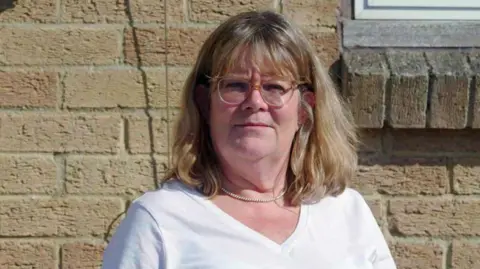 BBC
BBC“She’s probably done me out of quite a bit of money – I feel angry and conned.”
Julie Gallagher believes her home was sold at a lower price than it could have gone for. There was a buyer who might have offered more for it, an undercover investigation by BBC Panorama can reveal.
Her Connells estate agent appeared to sideline this potential buyer in favour of someone else who had agreed to take out an in-house mortgage.
That mortgage was said to be worth about £2,000 to Connells, while the company potentially stood to make £10,000 in total by arranging add-on services and selling the buyer’s property too.
“She sat on this sofa… and said she was actually working for me and she obviously is not, she’s working for the company’s ends,” says Julie. “How dare Connells do that? Just appalling.”
Panorama decided to investigate the company after speaking to more than 20 independent financial advisers (IFAs) and mortgage advisers from across England and Wales who had concerns about how the company operated.
One of the biggest estate agencies in the UK, Connells runs 80 chains with more than 1,200 branches. Our undercover reporter, Lucy Vallance, got a job in Abingdon, Oxfordshire, in an own-brand office.
During her six weeks there in February, she found evidence that the senior branch manager favoured prospective buyers, if they were planning to take out Connells in-house services, like conveyancing or mortgages, because it made more money for the company.
Connells told us it is “committed to treating all customers and prospective buyers fairly.”
Panorama also investigated the online estate agency Purplebricks, after we heard concerns it had been trying to attract sellers by overvaluing properties.
Once a customer was signed up, staff then tried to convince them to cut the asking price, earning commission if successful – a former sales negotiator told us. The whistleblower, who worked for the company between June and October 2024, also filmed online meetings for Panorama.
Purplebricks told us price reductions were once a target for rewarding staff, but that is no longer the case, and it does not overvalue properties to win instructions.
In Abingdon, the undercover reporter found that trying to arrange mortgages could be as important as selling houses – and that Connells’ staff felt under pressure to get people signed up.
Connells, like many other estate agencies, has an in-house mortgage-brokering team.
The independent financial advisers we have spoken to – who compete for customers with estate agents’ in-house services – say this pressure can lead to some agents in the industry playing fast and loose with the rules.
One practice known as “conditional selling” is forbidden by the Code of Practice for Residential Estate Agents, of which many companies across England, Wales, and Northern Ireland – including Connells – are signatories.
This is when an estate agent suggests, implies or tells you that you must arrange things like mortgages or conveyancing services through their in-house teams – or there will be negative consequences for a deal.
It means estate agents signed up to the code know they should not discriminate against prospective buyers who don’t use their in-house services.
Connells’ senior branch manager told our reporter, at one point, that she understood conditional selling was not allowed.
But that wasn’t the full picture.
Estate agents are supposed to work in the best interests of their clients, but we saw how pressure for profit shaped decisions at Connells in Abingdon.
One Saturday, our reporter was asked to host an open-house viewing for Julie’s four-bedroom house, which was on the market for offers over £300,000. It attracted great interest. Fifteen people attended and others also wanted to book separate viewings.
But the following Monday, the senior branch manager seemed interested in two possible buyers – those speaking to Connells’ in-house brokers. The next day, via WhatsApp, she told her staff not to arrange any more viewings on Julie’s house.
One signed up to a Connells-brokered mortgage and became known by the senior branch manager as a “hot buyer”.
A board in the office titled “Hot Buyers” had the names of all house hunters at the branch who had agreed to take out a mortgage or a conveyancing package through Connells.
The hot buyer for Julie’s house made an initial offer, which she rejected, but eventually upped it to successfully secure the property.
There was another potential buyer interested in the house who appeared to have deeper pockets – a cash buyer. She wasn’t taking out a mortgage through the company.
Connells told us they spoke to the cash buyer the Monday after the open house and that she was undecided about putting in an offer. A call from the cash buyer later the same day was missed, said the company, and not followed up.
When the undercover reporter told the office administrator that the cash buyer might have offered more, she was told that “just a sale” was “not good enough” for Connells.
“They will probably more likely aim to get somebody who’s signed up with us and wants to use our conveyancing, as opposed to someone who is a cash buyer,” said the administrator. “That’s just how Connells are. That’s why they ride you if you don’t have enough mortgage appointments.”

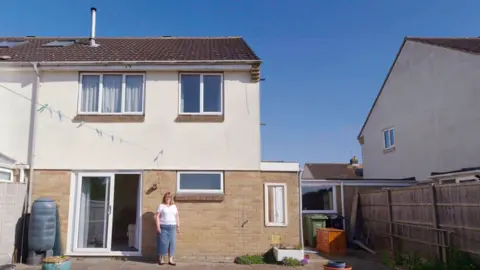
Lisa Webb, consumer law expert with Which? Magazine, reviewed Panorama’s evidence of how this sale was managed.
“This is absolutely something that should be against the law – and something that I think that these estate agents really ought to be investigated by the authorities for, because this should not be happening,” she told us.
The undercover reporter secretly filmed her boss – the senior branch manager – saying why she was so keen on the hot buyer. Not only would it mean collecting fees from the seller, the manager explained, but also commission from the in-house mortgage with conveyancing fees on top.
In addition, Connells would try to sell the hot buyer’s old house – and earn more fees.
The senior branch manager said the combined deal could, in total, be worth £10,000 to the company.
“That, in itself, is just appalling behaviour,” said Lisa Webb from Which? when we showed her the footage.

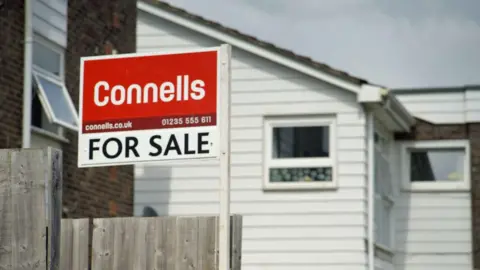
According to the 1979 Estate Agents Act it is classed as an “undesirable practice” for estate agents to discriminate against prospective buyers if they don’t take out a mortgage through in-house brokers.
If they do this, they can be investigated by Trading Standards. But it looks like the rules may not cover the sidelining of potential buyers as seen by Panorama’s undercover reporter.
Those rules need to be updated, according to financial journalist Iona Bain.
“There’s clearly a grey area here, whereby estate agents are able to accept one buyer that will use the in-house broker and turn everybody else away,” she told us.
Homeowner Julie, who has now packed up and left her house ahead of the sale going through, was horrified when we told her what had happened.
“I’m quite appalled really that… she [senior branch manager] has kind of taken options out of my hands and probably done me out of quite a bit of money, really.”
Connells said it rejects “any accusation of conditional selling” and that “no harm has been caused” to the customer. There were other offers on Julie’s property, it told us, but the accepted offer was the highest.
“It is not the case that customers who use our mortgage services are more likely to successfully purchase a property than those who do not,” it added. It said that in the six-week period Panorama was undercover, only two properties out of 14 went to customers using the in-house mortgage service.
It also said it invests “significant time and resources in training our teams to ensure they understand the laws, regulations and guidelines within which they must operate”.
“Any employee found to be in breach of these standards faces strict disciplinary action, including dismissal,” Connells said.
The senior branch manager told Panorama she was content for Connells to respond on her behalf.
At Purplebricks, a whistleblower began secretly filming meetings because she says she became frustrated with how the company was being run.
Firstly on her phone, then with a camera provided by Panorama.
The biggest shock for the whistleblower was learning that staff were being incentivised to get price reductions on properties – many of which, she was told by one of the company’s local property agents, appeared to have been put on the market for more than they were worth.
“We are overvaluing properties massively just to gain instructions,” said the agent to the whistleblower in a private message.
Estate agents often use property valuations to attract customers – and subsequently dropping the asking price is not unusual. The estate agents’ code tells companies they “must never deliberately misrepresent the market value of a property”.

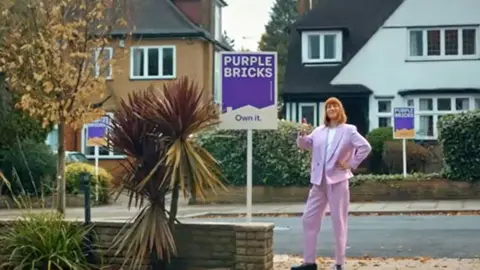
The whistleblower was also told in the same message from the agent that staff could earn commission if they persuaded sellers to drop their asking prices.
The same agent suggested to her that 18 price drops per month could earn staff £900 in commission.
In an online meeting, the whistleblower’s team leader told staff how to approach conversations with sellers about price drops.
He said, when properties go live, sellers can be told that if there aren’t many viewings or offers within the first four weeks then they should “have a conversation about [price] reduction”.
“So they won’t necessarily push the reduction there and then, but they will plant the seed,” he added.
Purplebricks told us it doesn’t overvalue properties and that while price reductions were once a target for rewarding staff, that was no longer the case. It said it doesn’t claim to be perfect and apologises wherever it has fallen short.

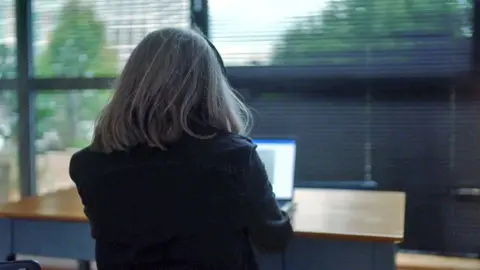
Purplebricks staff were also under pressure to sell financial products like mortgages and conveyancing, the whistleblower told us.
During the time she worked there, she said the company encouraged customers to get their conveyancing done through companies it had deals with, rather than look elsewhere.
“We don’t want them to get a quote for comparison because we are by far and away very expensive,” said her team leader during an online meeting.
When Ryan Evans and Olivia Phelps bought a two-bedroom house in Sutton-in-Ashfield through Purplebricks they ended up buying conveyancing services through the company.


They paid £2,820 last summer. Using price comparison websites, Panorama found that was nearly three times more than the current cheapest quote for the same property.
“We were none the wiser having never done all this before. I certainly felt like maybe they [Purplebricks] had taken advantage of us a bit because we were first-time buyers,” Ryan told us.
Like Connells, Purplebricks is also signed up to the Code of Practice for Residential Estate Agents which says: “You should provide a service to both buyers and sellers consistent with fairness, integrity and best practice.”
Our whistleblower also recorded her team leader firing-up staff to sell add-on products in addition to conveyancing.
“So let’s try and really squeeze every lead for as much as it’s got – and I want us to be a bit more relentless,” he told staff at one meeting. “The urgency is massive… there is still a heinous amount of money to be made.”
Anyone working in sales is encouraged to sell more, says Lisa Webb of Which?, but it is “a real issue” if an estate agent is “incentivising someone to make a very quick decision” or pressuring them “into making decisions too quickly… before they’ve had the option to shop around”.
Purplebricks said it entirely rejects any portrayal of its service as pressure-selling, adding that it does not promote hard-selling and that it focuses on the benefits, not price, when recommending services.
In a statement, it also said that since new owners took over in 2023, it has “worked hard to improve service and build a team and culture that puts customers first”.
The whistleblower’s team leader did not want to comment and told us he had left Purplebricks.
Ursula von der Leyen says bloc hopes to see negotiated solution to trade tensions.
The European Union has delayed retaliatory tariffs on exports from the United States as officials scramble to reach a trade deal with Washington ahead of US President Donald Trump’s August 1 deadline.
Ursula von der Leyen, the president of the European Commission, said on Sunday that the bloc would extend its suspension of countermeasures as it continued negotiations with the Trump administration.
“At the same time, we will continue to prepare for the countermeasures, so we’re fully prepared,” von der Leyen said during a news conference in Brussels.
“We have always been very clear that we prefer a negotiated solution,” she added.
“This remains the case, and we will use the time that we have now until the 1st of August.”
The EU’s announcement comes after Trump on Saturday unveiled plans to slap a 30 percent tariff on European and Mexican exports from August 1.
The EU in March announced retaliatory tariffs on 26 billion euros ($30bn) of US exports in response to Trump’s duties on steel and aluminium.
The bloc paused the measures for 90 days the following month after Trump announced he would delay the implementation of his so-called “reciprocal tariffs”.
The EU’s pause had been due to expire at midnight on Monday.
EU trade ministers are scheduled to convene in Brussels on Monday to discuss options for responding to Trump’s latest tariff threats.
On Sunday, White House Economic Adviser Kevin Hassett said that Trump was not happy with the “sketches of deals” presented by US trade partners so far and that their offers would “need to be better”.
“These tariffs are real if the president doesn’t get a deal that he thinks is good enough, but, you know, conversations are ongoing, and we’ll see where the dust settles,” Hassett told ABC News’s This Week.
Taken together, EU member countries are the US’s largest trading partner.
US-EU trade in goods and services amounted to 1.7 trillion euros ($2 trillion) in 2024, according to EU statistics agency Eurostat.
Here are the key events on day 1,236 of Russia’s war on Ukraine.
Here is how things stand on Monday, July 14:
US president makes announcement amid growing frustration with Russian President Vladimir Putin.
United States President Donald Trump has said he will send Patriot air defence systems to Ukraine as his administration signals growing disillusionment with Russian President Vladimir Putin’s refusal to negotiate an end to Moscow’s invasion.
“We will send them Patriots, which they desperately need,” Trump told reporters at Joint Base Andrews in Maryland on Sunday.
“Putin really surprised a lot of people. He talks nice and then he bombs everybody in the evening,” Trump said.
“So, there’s a little bit of a problem there. I don’t like it.”
Trump said he had not decided on the number of Patriot batteries he would send to Ukraine, but “they’re going to have some because they do need protection.”
Trump’s comments come after he last week confirmed that his administration had decided to sell weapons to NATO allies in Europe for them to pass on to Kyiv.
Trump is set to meet NATO Secretary-General Mark Rutte this week for discussions expected to focus on his plans to supply weapons to Kyiv.
Rutte’s trip to Washington, DC comes as Trump has teased that he will make a “major statement” on Russia on Monday.
After campaigning on a promise to bring a swift end to the war in Ukraine, Trump has expressed growing frustration with Putin’s refusal to agree to a peace deal.
While Putin has agreed to brief pauses in fighting, he has knocked back US proposals for an unconditional 30-day ceasefire.
Russia has argued that the proposal, which has been accepted by Ukraine, would give Kyiv a chance to remobilise its troops and rearm.
In some of his strongest criticism yet of Putin, Trump on Tuesday accused the Russian leader of throwing a lot of “b******” at the US.
“He’s very nice all the time, but it turns out to be meaningless,” Trump said.
After returning to the White House in January, Trump moved to scale back support for Kyiv, casting Washington’s aid as a drain on the US taxpayer and accusing Ukrainian President Volodymyr Zelenskyy of being an obstacle to peace.
While Ukraine continued to receive weaponry through funds allocated during the tenure of former US president Joe Biden, Trump had declined to approve new arms shipments to help Kyiv repel Moscow’s invasion.
Following months of unsuccessful efforts to broker a peace between Moscow and Kyiv, Trump on July 7 announced that he would begin approving shipments to Ukraine comprised mostly of “defensive weapons”.
Asked on Sunday if his upcoming announcement on Russia would involve sanctions against Moscow, Trump declined to answer but repeated that he was disappointed with Putin.
“I am very disappointed with President Putin. I thought he was somebody that meant what he said,” Trump said.
“And he’ll talk so beautifully, and then he’ll bomb people at night. We don’t like that.”



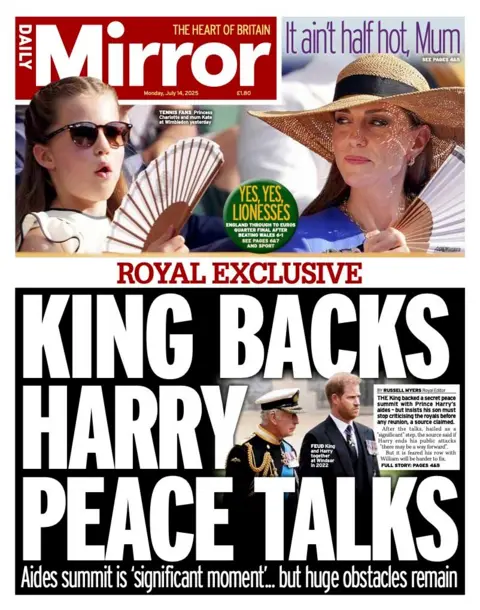



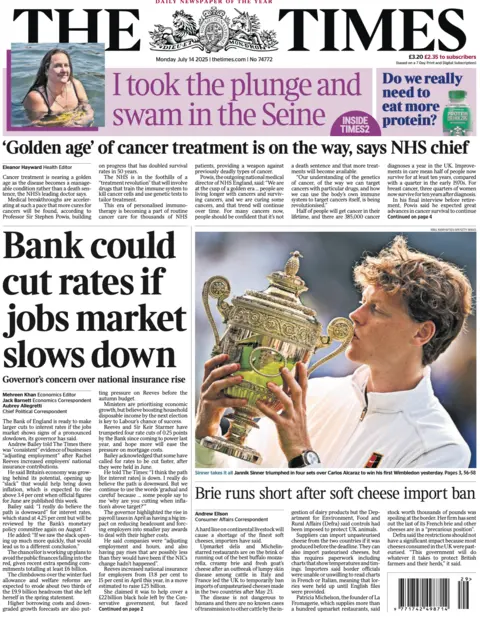

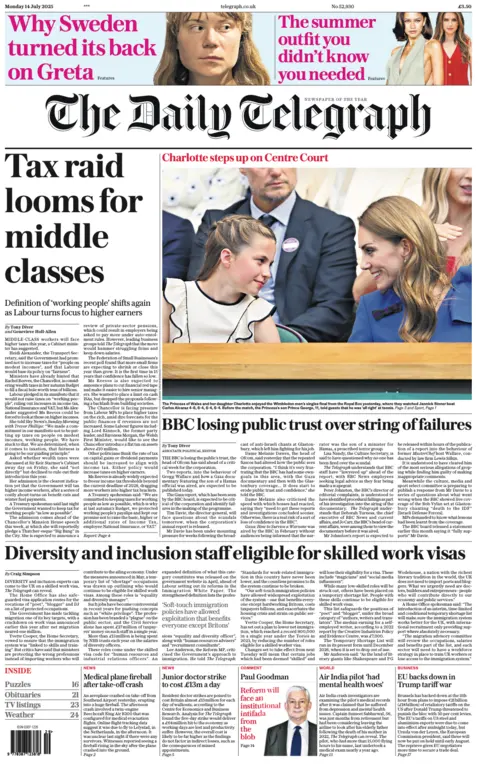

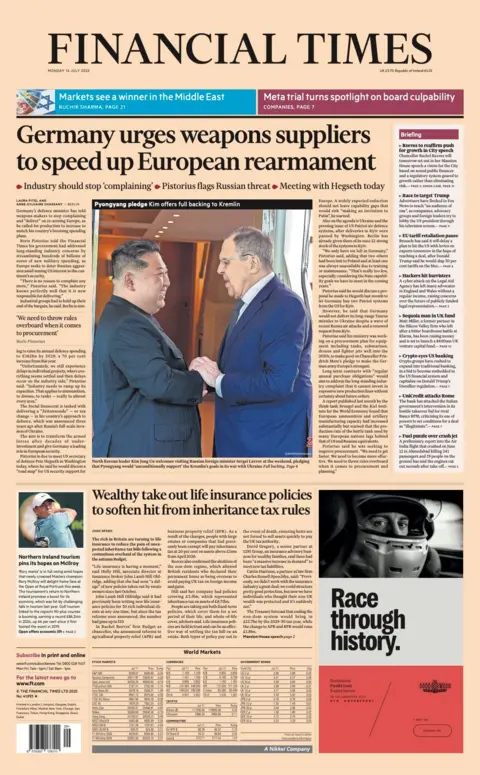



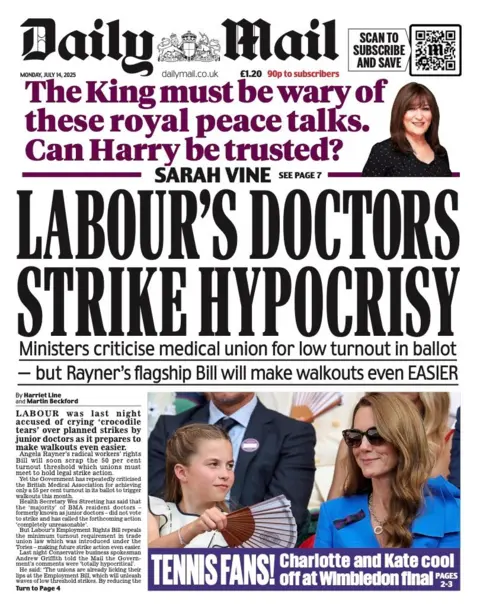

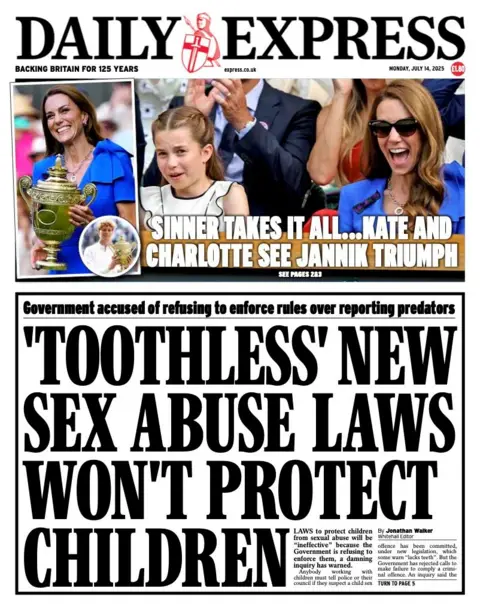

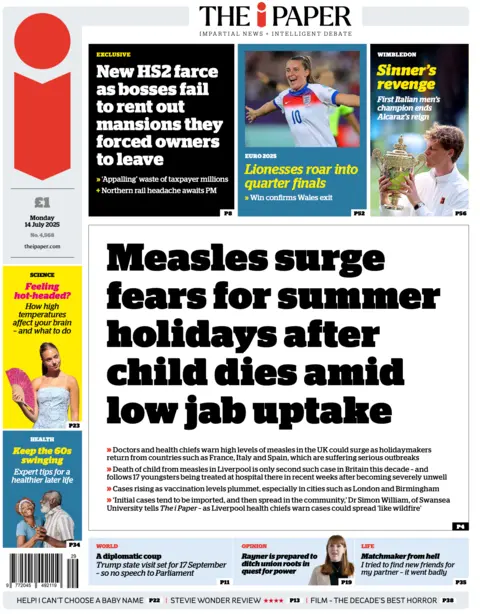

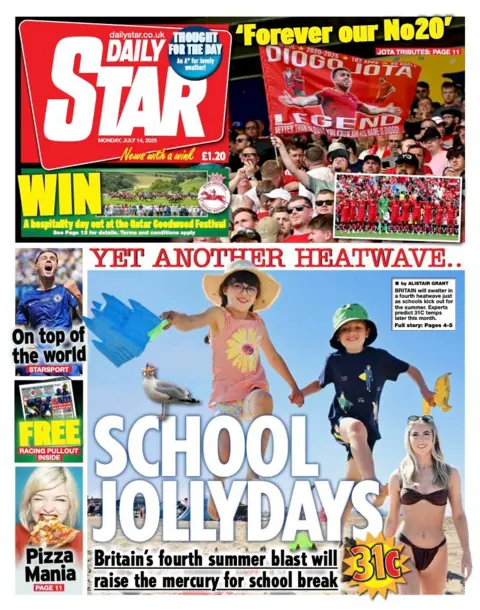




Remarks by Chinese embassy spokesperson in New Delhi come ahead of Indian foreign minister’s visit to China – the first since 2020 clashes.
The succession of the Tibetan spiritual leader the Dalai Lama is a “thorn” in China-India relations, says the Chinese embassy in New Delhi.
The remarks on Sunday came ahead of the first visit by India’s foreign minister to China since the deadly border clashes between the South Asian powers in 2020.
“In reality, [the] Xizang-related issue is a thorn in China-India relations and has become a burden for India,” Yu Jing, a Chinese embassy spokesperson, posted on X, referring to “Xizang”, the Chinese name for Tibet.
Ahead of celebrations this month for his 90th birthday that were attended by senior Indian ministers, the Dalai Lama angered China again by saying it had no role in his succession.
Tibetans believe the soul of any senior Buddhist monk is reincarnated after his death, but China says the succession will also have to be approved by its leaders.
The Dalai Lama has been living in exile in India since 1959 following a failed uprising against Chinese rule in Tibet.
Indian foreign relations experts say his presence gives New Delhi leverage against China. India is also home to about 70,000 Tibetans and a Tibetan government-in-exile.
In her post, spokesperson Yu, without naming anyone, said some people from strategic and academic communities in India had made “improper remarks” on the reincarnation of the Dalai Lama.
“As professionals in foreign affairs, they should be fully cognizant of the sensitivity of issues related to Xizang,” Yu said. “The reincarnation and succession of the Dalai Lama is inherently an internal affair of China.”
🔹It has been noted some people from strategic and academic communities, including former officials, have made some improper remarks on the reincarnation of Dalai Lama, contrary to Indian government’s public stance.
🔹As professionals in foreign affairs, they should be fully… pic.twitter.com/HlG2IdvW1P— Yu Jing (@ChinaSpox_India) July 13, 2025
Indian Parliamentary and Minority Affairs Minister Kiren Rijiju, who sat next to the Dalai Lama during his 90th birthday festivities a week ago, has said that as a practising Buddhist, he believes only the spiritual leader and his office have the authority to decide on his reincarnation.
India’s Foreign Ministry said on July 4, two days before the Dalai Lama’s birthday, that New Delhi does not take any position or speak on matters concerning beliefs and practices of faith and religion.
India’s External Affairs Minister S Jaishankar will be attending a regional security meeting under the Shanghai Cooperation Organisation in Tianjin in northern China on July 15 and hold bilateral meetings on the sidelines.
This will be one of the highest-level visits between India and China since their relations nosedived after a deadly border clash in 2020 that killed at least 20 Indian and four Chinese soldiers.